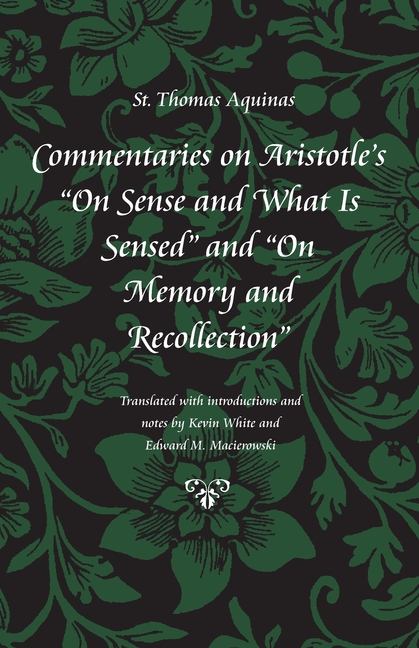Newly released
This book is new and will be uploaded as soon as it becomes available to us and if we secure the necessary publishing rights.

Commentary on Aristotle's Book PDF
(0)
Author:
Thomas AquinasNumber Of Reads:
176
Language:
English
Category:
Social sciencesSection:
Pages:
279
Quality:
excellent
Views:
1127
Quate
Review
Save
Share
Book Description
Commentary on Aristotle's "On Sense and What Is Sensed" and "On Memory and Recollection"
In keeping with the order found in traditional catalogues of Aristotle’s works, Thomas Aquinas began his series of Aristotelian commentaries with a commentary on "On the Soul," which he followed with commentaries on "On Sense and What Is Sensed" and "On Memory and Recollection," written in 1268-70. Until now, these latter two commentaries have never been published in English translation. The translations presented in this volume are based on the critical Leonine edition of the commentaries and include English translations of the Aristotelian texts on which Aquinas commented. Thomas’s commentary on "On Sense and What Is Sensed," translated and introduced by Kevin White, clarifies and develops Aristotle’s discussion of sense-powers, his "application" of sense-powers to organs and objects, and his concluding questions concerning the object and medium of sensation, and the role of the "common sense." In "digressions" from his literal exposition, Aquinas presents discussions bearing on psychology, epistemology, natural philosophy, and metaphysics. The commentary on "On Memory and Recollection," translated and introduced by Edward Macierowski, deals in the first three chapters with memory and address three questions: "What is memory?" "To what part of the soul does memory belong?" and "What is the cause of remembering?" The last eight chapters, which deal with recollection, also address three questions: "What is recollection?" "How does recollecting take place?" and "What is the difference between memory and recollection?" In "digressions," Aquinas explores more fully the issues arising from the exposition of the text.
Thomas Aquinas
Thomas Aquinas (Dominican monk) (1225 - 1274) was an Italian Catholic priest and saint of the Dominican Order, and an influential philosopher and theologian within the scholastic tradition. One of the thirty-three teachers of the Church, known as the angelic world (Doctor Angelicus) and the surrounding world (Doctor Universalis). He is usually referred to as Thomas, and Aquinas attributes it to his residence at Aquinas. He was one of the influential figures in natural theology, and is the father of the Thomistic school of philosophy and theology. His influence is wide on Western philosophy, and many of the ideas of modern Western philosophy are either a revolution against his ideas or an agreement with them, especially in matters of ethics, natural law and political theory. Aquinas is considered the ideal teacher for those studying to be priests in the Catholic Church. He is known by his operation as the epitome of divinity, creation, and the Creator. Many Christians consider him the Church's greatest philosopher, so many educational institutions are named after him.
Book Currently Unavailable
This book is currently unavailable for publication. We obtained it under a Creative Commons license, but the author or publisher has not granted permission to publish it.
Rate Now
5 Stars
4 Stars
3 Stars
2 Stars
1 Stars
Commentary on Aristotle's Quotes
Top Rated
Latest
Quate
Be the first to leave a quote and earn 10 points
instead of 3
Comments
Be the first to leave a comment and earn 5 points
instead of 3